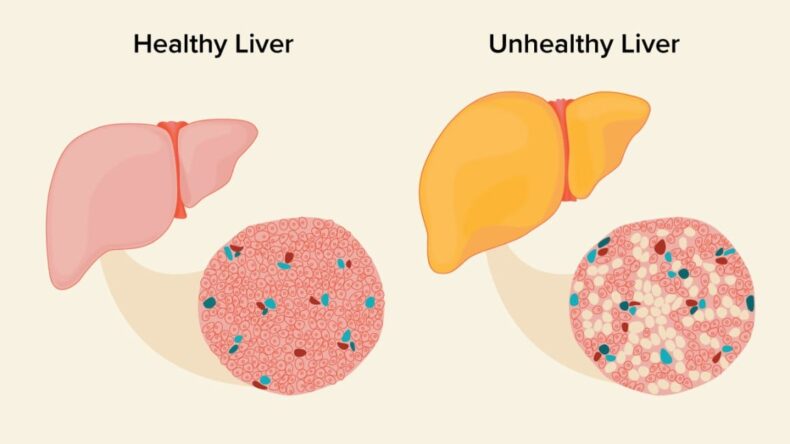Table of Contents

Fatty liver disease can be caused by a variety of factors, including a high-calorie diet, obesity, diabetes, high cholesterol, and excessive alcohol consumption. To reduce fatty liver disease, it’s important to address the underlying causes. Fatty liver disease is also known as hepatic steatosis.
Severe diseases due to Fatty liver.
Cirrhosis:
Cirrhosis is a condition in which the liver becomes severely scarred due to chronic liver damage. It is a life-threatening condition that can lead to liver failure, liver cancer, and death. This disease is one of the leading causes of cirrhosis, and it can occur in people who consume excessive amounts of alcohol, as well as those with NAFLD or NASH.
Liver cancer :
It increases the risk of liver cancer. When the liver becomes inflamed and damaged, the risk of developing cancer increases. Liver cancer is a serious and life-threatening disease that can be difficult to treat, especially if it is detected at a late stage.
Cardiovascular disease :
Fatty liver disease can also increase the risk of cardiovascular disease, which is a group of conditions that affect the heart and blood vessels. People with this disease are more likely to have high blood pressure, high cholesterol, and diabetes, which are all risk factors for cardiovascular disease. Cardiovascular disease can lead to heart attack, stroke, and other life-threatening conditions.
Type 2 diabetes:
Fatty liver disease is also linked to an increased risk of type 2 diabetes. People with NAFLD or NASH are more likely to develop insulin resistance, which can lead to high blood sugar levels and eventually type 2 diabetes. Type 2 diabetes can lead to several life-threatening complications, including kidney disease, heart disease, and nerve damage.
Fatty liver disease can lead to several life-threatening diseases, including NAFLD, NASH, cirrhosis, liver cancer, cardiovascular disease, and type 2 diabetes. The best way to prevent this disease is by maintaining a healthy weight, exercising regularly, and avoiding excessive alcohol consumption. If you have fatty liver disease, it is important to work with your healthcare provider to manage your condition and reduce your risk of developing these serious health complications.

How can we reduce fatty liver disease?
Here are some remedies which can help:
Manage your weight: If you are overweight or obese, losing weight can help reduce fatty liver disease. This can only be possible if a person follows healthy diet and regular exercise.
Exercise regularly: Exercise can help reduce the amount of fat in your liver and improve liver function. Aim for at least 150 minutes of aerobic activity per week. Researchers at the University of Illinois, Chicago have found that doing alternative fasting and exercise can improve the liver condition .According to studies, nutrition researchers experimented with 80 people with Non- Alcoholic fatty liver disease and found that those who exercised and alternatively fasted showed improvement. Meanwhile, others were constant.
Eat a healthy diet: A healthy diet can help improve liver function and reduce the amount of fat in your liver. This includes eating plenty of fruits, vegetables, whole grains, and lean protein sources, while limiting your intake of sugar, saturated and trans fats.
Limit alcohol consumption: If you have fatty liver disease, it’s important to limit your alcohol consumption or avoid it altogether.
Manage your diabetes and cholesterol: If you have diabetes or high cholesterol, managing these conditions can help reduce it.
Avoid certain medications: Some medications, including corticosteroids and some cancer drugs, can cause the disease. If possible, try to avoid these medications or work with your doctor to find an alternative.
Consider supplements: Some supplements, such as vitamin E and omega-3 fatty acids, may help reduce fatty liver disease. However, it’s important to speak with your doctor before taking any supplements, as they may interact with other medications or medical conditions.
It’s important to note that the above strategies are not a substitute for medical treatment. If you have fatty liver disease, it’s important to work with your healthcare provider to determine the underlying cause and develop a treatment plan that’s right for you.













